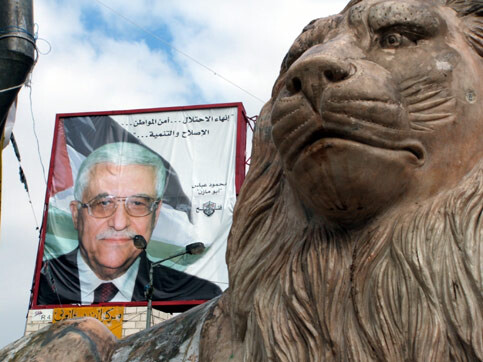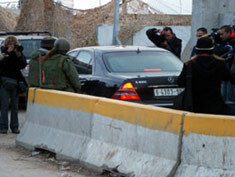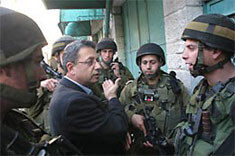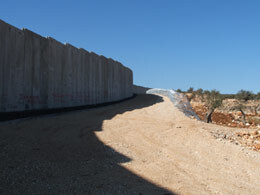The Electronic Intifada 7 January 2005

A billboard for Mahmoud Abbas looms over Ramallah’s Manara Square (Maureen Clare Murphy)
At first glance, the beginning of 2005 seems like a fresh breath in Israel-Palestine — the U.S. and Israel have just seen the death of the “non-partner” Yasser Arafat, Israeli Prime Minister Ariel Sharon is pushing his Gaza disengagement plan, and this weekend the Palestinians will be having their first presidential elections in nearly ten years. But time will likely prove that these are false prospects for hope, and that the region, and the Palestinians in particular, will continue to gasp for a resolution to the long-standing Israeli-Palestinian conflict.
And it is precisely because they are gasping that the majority of Palestinians are likely to vote for Israeli and American favorite Mahmoud Abbas, known more familiarly here in Palestine as “Abu Mazen”. Abu Mazen doesn’t possess the cult of personality and heroic history that Yasser Arafat did, and he appears awkward wearing the traditional checkered keffiyeh over his silk tie and tailored suit. He is widely seen as corrupt, and likely to sell out to the Israelis and Americans many of the Palestinian rights enshrined in international law. But Palestinians will vote for him anyway.
Though Palestinians are disenchanted with the often-shady Palestinian Authority and Abu Mazen, and they hold little optimism over his victory, people will vote for Abu Mazen because he has the best relationship with the U.S. and Israel, and thus the best chance at striking a peace deal — however paltry a peace deal it may eventually be. The second-highest polling candidate, Dr. Mustafa Barghouthi, doesn’t enjoy this status as favorite, nor does he have the influence over the various militant factions in the Palestinian territories like his rival, whom Palestinians are voting for out of pragmatism rather than idealism.
It is fair to say that despite not having a presidential election since 1996, Palestinians are hardly euphoric over the upcoming vote. While President Bush stated December 20, “There will never be peace until a true democratic state emerges in the Palestinian territory,” Palestinians, and anyone else who cares to examine the realities happening on the ground, know that peace depends on the cessation of the Israeli military occupation Palestinians have been enduring since 1967, the reaching of a just solution to the Palestinian refugee problem, and the ability for both Israelis and Palestinians to exercise their self-determination.
Bush also declared that this election is “the beginning of the process toward the development of a state.” If this election is the first process of a future state, then we can only hope that Palestinians will be allowed to build a state under better conditions that they are expected to hold an election. Because it is being held under the thumb of a cruel and unrelenting Israeli occupation, and because the international media and key players are only paying attention to one candidate, the elections are far from free and fair.

Not even Israeli and American favorite Mahmoud Abbas is exempt from driving through Israeli-controlled checkpoints. Journalists photograph his car as it drives through the Qalandiya checkpoint at Ramallah 7 January 2005 (Maureen Clare Murphy)

Presidential candidates have found it impossible to reach constituents and campaign effectively due to Israeli restrictions of movement on all candidates except Mahmoud Abbas. Pictured above, Dr. Mustafa Barghouthi attempts to negotiate with Israeli soldiers during a campaign jaunt.
The environment in which the Palestinians are being made to hold their elections is absurd. Of course, the Palestinians have long been working towards democracy and elections, and it is per Palestinian law that the elections are being held. Voting registration began before Yasser Arafat passed away November 11, and the Palestinian Central Elections Commission (CEC) has worked hard to make sure the election process is as equitable as possible, given the circumstances. But let’s look at the circumstances that are surrounding this election.
The Israeli military occupation forces have killed at least ten children and ten adults in Palestine since the beginning of the new year. Several of the presidential candidates have been detained multiple times by the same occupying forces, and one of the candidates and his entourage have even been beaten.
The two candidates in Gaza wishing to campaign in the West Bank were required to apply for permission from the Israeli occupying forces, a long process that rarely results in success. The candidates in the West Bank, wanting to meet with constituents in Gaza, had to do the same. A 17-year-old high-school student pasting a campaign poster in Gaza was shot to death by the Israeli occupation forces, which has also been repeatedly invading the north of Gaza and raiding Palestinian cities searching for “wanted” persons who, when captured, will be likely held without charge and not be granted a due trial.
Palestinians this side of the Qalandiya checkpoint at Ramallah will be surprised if many of their countrymen and women in Jerusalem even show up to the polls. Due to a mystifying provision made in the Oslo agreements, only 5,367 East Jerusalemites have the ability to vote in their city, at Israeli-controlled post offices, where their ballots will be transported by Israeli postal officials, rather than Palestinian Central Election Commission (CEC) workers. The thousands of other East Jerusalem residents who wish to vote for their next president must do so in the suburbs of Jerusalem, leaving them vulnerable to Israeli checkpoints, where many fear they will lose their IDs that give them residency status in East Jerusalem.
Those in East Jerusalem who voted in 1996 remember Israeli authorities photographing them, and noting their names in their records. As Israel more and more aggressively imposes its illegal annexation of the city, Palestinians fear exercising their electoral rights will negatively affect their residency rights there. Israeli authorities closed the CEC’s six registration centers in Jerusalem in September 2004, and a number of its employees were arrested. And because David Edri of Israel’s National Religious Party has promised to intimidate Palestinian voters casting their ballots at East Jerusalem post offices by delaying them and taking their photographs, East Jerusalem’s 120,000 eligible voters have even more to fear.
Countless others will not be able to vote, because they are registered in a jurisdiction different than the one in which they live. Since Israel’s system of checkpoints and road closures makes commuting within the West Bank and Gaza Strip nearly impossible, many Palestinian students and laborers live in governorates away from their families. They too will be intimidated from coming to the polls on Sunday, and there is no system in place for them to vote by proxy or by absentee ballot. So while some 70 percent of West Bank and Gaza Palestinians are registered to vote, who actually turns out to the polls will be another matter. And it is unlikely that Israel will decide before Sunday to let the thousands of Palestinians stranded at the Rafah-Egypt terminal to enter the Gaza Strip and exercise their electoral rights.
And any remaining patina of integrity remaining on the elections is further washed away by the way Abu Mazen was granted victory by the international community weeks before the election campaign even began. The fact that Israel has allowed him to campaign at the Al-Aqsa Mosque in East Jerusalem, and enter the Gaza Strip, while other candidates have to jump through hoops just to travel within the West Bank, further tarnishes the credibility of the elections. Abu Mazen may be elected, but he won’t have the luxury of an unblemished victory to support his presidency. And as Israel continues to annex more and more Palestinian land, the Palestinians will need a strong leader more than ever.
The real question here is not who will be elected, but over what the new leader will have authority. Palestinians don’t have control of their water reources, their airspace or their roads. And movement within the West Bank and Gaza Strip is controlled by the Israeli occupying forces via hundreds of checkpoints and roadblocks that dot the Palestinian territories, serving to further annex large parts of the Palestinian territories already segmented by Israel’s illegal colonies and wall. Of course, this is what Palestinians are fighting against by demanding their independence and the ability to eke out a livelihood and provide security for their families. And until these unjust conditions, created by Israel in its drive to eat up more Palestinian land and resources, are remedied, there is realistically little the new Palestinian president can do to bring about long-term peace.

The Israeli annexation wall at Bethlehem (Maureen Clare Murphy)
This exercise in Palestinian democracy on January 9 is just that — it will not bring about a democratic product, a free and viable state with an independent economy. Israel and its closest ally and major funder, the U.S., must bring this about; and even if this occurs there is still the refugee problem to resolve.
One could make the argument that the elections are a liability for the Palestinians. So much talk is being made of the new president being the impetus for peace that the burden of conflict resolution seems to be placed on the back of the future president, who will have little ability to remove the aforementioned obstructions to justice. Instead of paying attention to the new “facts on the ground” Israel is creating, world focus will be on what actions the new president will take against Palestinian militants. The elections, while necessary, are yet another excuse for the international community to ignore the roots and thrust of the conflict — the expulsion of 750,000 Palestinians in 1948 from their land during the creation of the state of Israel, and the continued colonization of the remaining 22 percent of historic Palestine.
Related links:
Maureen Clare Murphy, currently living and working in Ramallah, is a registered domestic observer with the Palestinian Central Elections Committee. She is also Arts, Music and Culture Editor for The Electronic Intifada.



